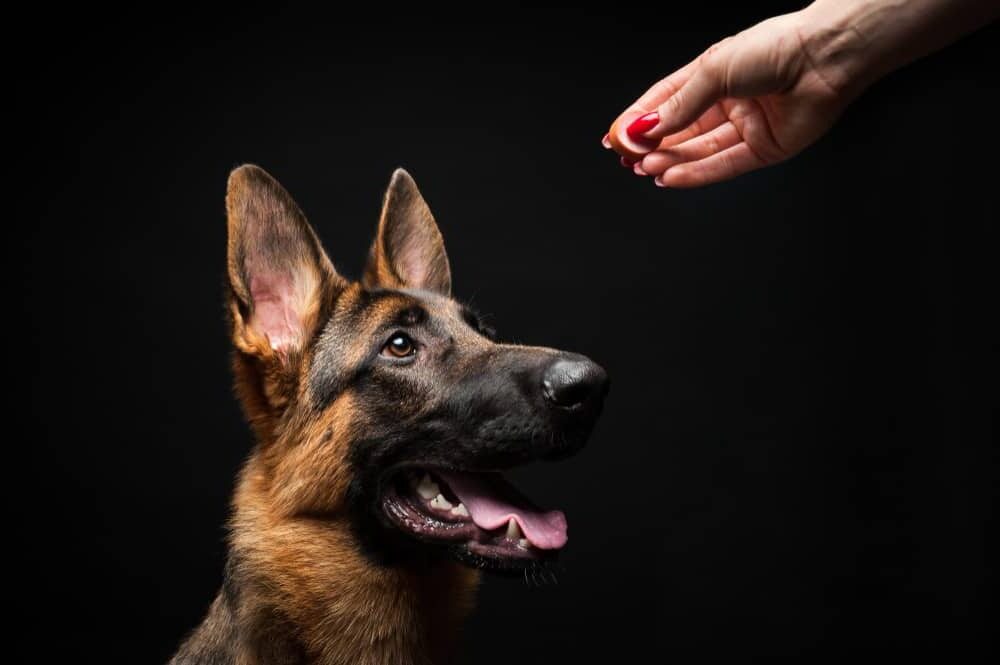German Shepherds are the second most popular breed for good reasons. Their level of intelligence and the ability to do almost anything is unparallel. They love to please their handlers and can learn fast. As a Professional Canine Behavior Consultant who has worked with countless German Shepherds and their owners, it’s my goal to make you successful when it comes to training your GSD.
Training German Shepherds require consistency, patience, and kindness in order to be successful. The breed is highly focused and intelligent, thus they are able to learn quickly and will be paying close attention to your guidance. And they will thrive when given “work” to do.
Whether you’ve just brought home a GSD puppy or want to teach your old dog new tricks, this article is going to set you up with the right mindset to become successful in training your beloved GSD.
Training Your GSD: What Does Success Look Like?
In my experience, success in training looks like happiness – some of the most “obedient” dogs remind me of robots that can do the same trick every time.
Your GSD may even be too afraid to make a mistake so they simply just do as they’re told without any kind of excitement or joy. Your pup will have all the good manners and be a goofball at the same time.
If you are looking for a step-by-step training guide for your puppy, check out this guide below:
German Shepherd Training: The Ground Rules for Success
First thing first, training your GSD doesn’t have to be hard – it should be fun for both of you!
Let’s go over these some ground rules to set both you and your dog up for success:
Rule #1. Understanding your dog’s L.E.G.S. (Learning, Environment, Genetics, and Self)
Applied Ethologist, award-winning certified professional dog trainer, and canine behavior consultant Kim Brophey introduces a comprehensive framework known as L.E.G.S (Learning, Environment, Genetics, Self). It is a way to explain all four aspects of a dog’s behavior.
“Learning about the type of dog that you have, their history and what they’re use for. And then changing your perception and your expectations for your dog’s behavior…you’ll realize a lot of what they’re doing might be making you mental or making you think that there are something seriously wrong with your dog, might just be completely typical for that breed.“
Kim Brophey
Learning – What has he learned from you during training and during downtime? What kind of training methods or tools have been used and what kind of association has been created to your presence?
Environment – A German Shepherd’s environment is his whole world – the inside of the house, the backyard, the neighbors, the cabin at the lake, anything and everything that happens in his world, in his environment, plays a significant role in his behaviors.
Genetics – The genetic component of a GSD’s behavior is certainly a factor – his breeding could mean that he was built for the extreme drive or just intended to be a family dog. If you’re purchasing from a breeder, be sure to ask about this.
Self – Your GSD is as unique as you are from your siblings – each GSD has his own emotions, his own likes and dislikes. He has his own allergies or digestive complications, his own nutritional, physical and mental stimulation needs.
Watch this interview if you want to learn more about Kim’s advice on helping your dog to thrive.
Rule #2. Use an errorless learning approach as opposed to “trial and error”
The “errorless” learning approach involves managing the environment in order for wanted behavior to be more likely to occur and unwanted behaviors unlikely to occur while creating a strong reinforcement history for the wanted behavior. Training sessions are broken down carefully to reduce the chances of your GSD making a “mistake”.
Rule #3. Adapt a differential reinforcement schedule
This is to replace any unwanted behaviors rather than punish them and risk negative behavior fallout. his means using a DRI (differential reinforcement of incompatible behavior).
For example, teach your GSD to sit instead of jump on a guest. He can’t sit and jump at the same time, making the replacement behavior incompatible with the unwanted one.
Rule #4. Always use positive reinforcement
Behaviors that are reinforced are much more likely to continue – if you like it, pay for it! No one works for free, especially our GSDs.
Are German Shepherds Easy to Train?
German Shepherds are big, bold and have lots of energy, they are not for everyone.
But if you’re patient, consistent, physically capable of handling a large dog, and are a true lover of the amazing creature we call the German Shepherd Dog, you can train him quite easily.
When Should I Start Training My GSD?
Whether you’ve just brought home an 8-week-old puppy or an older GSD, he’s going to need some time to adjust. It can take 3 days just to feel comfortable enough to eat/sleep, 3 weeks to start to see him relax and learn that he’s home, and 3 months to get into a routine. Be patient and train at his pace.
Do GSDs Need Different Training Methods Than Other Dogs?
It is a myth that large breeds like the GSD require a “heavy hand”. The excuses behind this myth include statements like “no single method works for all dogs” and “all dogs learn differently”.
Thanks to behavioral science and peer-reviewed studies, we have learned that more frequent use of punishment-based methods is associated with lower obedience and learning ability while more frequent use of positive reinforcement methods is associated with better obedience and learning ability. (Source: SPCA) A German Shepherd may need more physical/mental stimulation than a chihuahua, but they both learn the same way.
What Kind of Mentality Should an Owner Have When Training A GSD?
In order to be successful in training and living with such an incredible animal, a GSD owner needs to have the mentality that although his dog is domesticated from wolves, he is in fact not a wolf and should not be trained as one, contrary to popular opinion.
The American Kennel Club’s definition of a GSD reads “generally considered dogkind’s finest all-purpose worker, the German Shepherd Dog is a large, agile, muscular dog of noble character and high intelligence. Loyal, confident, courageous, and steady, the German Shepherd is truly a dog lover’s delight.”
What is Most Important When Training A GSD Puppy?
From birth to 14 weeks of age is an especially sensitive developmental stage for your GSD.
Check out petprofessionalguild.com for a list of handy resources on puppy training. Here are a few things to keep in mind:
A puppy’s first fear stage is between 8 and 10 weeks of age – he’s very sensitive during this time
His socialization window closes at 12 to 14 weeks of age so it’s important to expose him to as much as possible, as CAREFULLY as possible.
Obedience/manners training can come later – proper exposure and forming a safe bond with you comes first, no matter what.
What is Most Important When Training an Adolescent GSD?
Adolescence describes the “teenage” developmental stage of life for your GSD. This is the time of his life when hormones are changing, brain mapping is occurring, and a second fear stage is upon him (6 to 14 months of age).
It is during this time that it feels like all of your previous training has gone out the window. You
could say that he has turned his brain off and once it reboots in about a year, you’ll have your dog back!
This is the stage of life where it’s best to focus on meeting both mental and physical needs the best you can and not worry too much about perfecting any kind of skill, especially if it’s a struggle for both of you. For mental stimulation ideas see the guide Canine DIY Enrichment by ASPCA.
What is Most Important When Training an Adult GSD?
In general, a German Shepherd reaches social maturity between 2 and 3yrs of age.
When he turns 2, you may see a whole lot of new behaviors popping up that don’t make any sense! He is becoming an adult and this too is a sensitive developmental stage of life.
By this time, the majority of his skills are strong and he has formed a strong bond with his family. His joint plates will have closed at around 18 months so he’s able to go anywhere and do almost anything with you without too much risk of injury.
This is the best time to find something new to do – whether it’s agility, dock diving, scent training or any other sport that may be available in your area.
Conclusion
I bet no German Shepherd Owner would disagree owning a GSD is one of the best things they’ve ever had in their lives. And more often than not, the training is an integral part starting from the first day their furry friends enter their homes. But the hard work has proven to be worth it.
Further Questions
Can you teach old dogs new tricks?
He sure can! German Shepherds are highly intelligent and are always looking for a new adventure. If you find the right paycheque, he will do the work! Teach a new trick whenever you can, to boost his confidence and give him something to show off at the dog park in front of his friends.
When should I hire a professional to help me train my GSD?
It’s time to ask for help from a qualified professional if you feel like you are unable to physically handle your GSD, if you are struggling to understand any concerning behaviors or if you just
want to learn more about training!
Where can I find the best books on training?
Currently, the best place to look for science-based, humane training resources (books, videos, training manuals) is www.dogwise.com.
If you want to learn more about how to be a professional dog trainer or behavior consultant, Dognostics Career Center is a great place to start.









